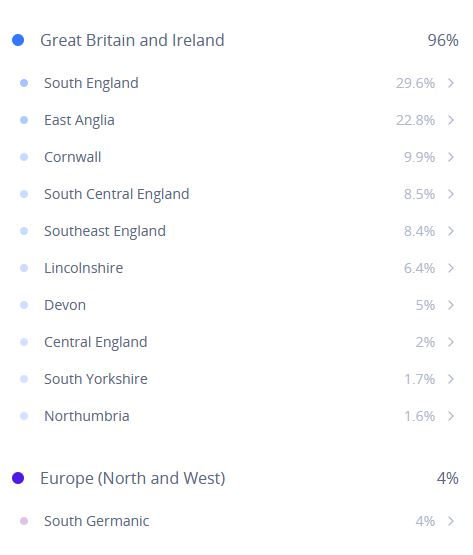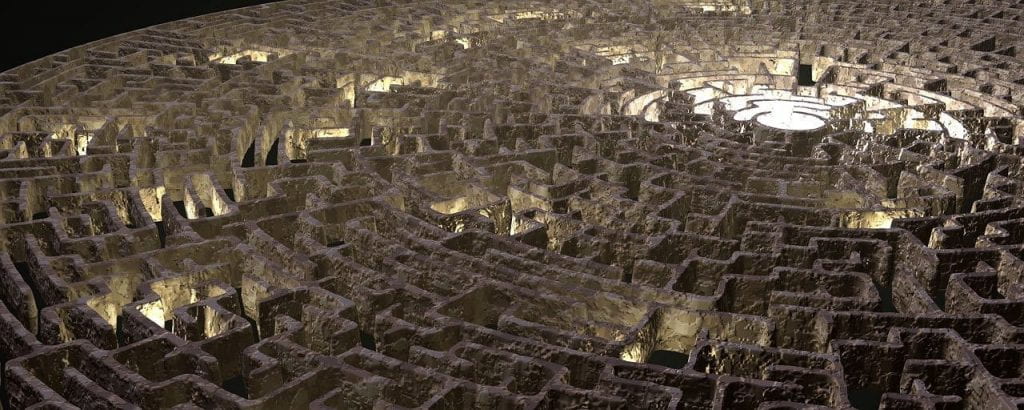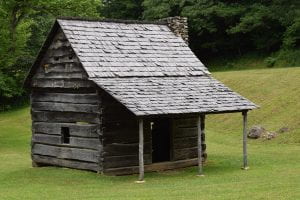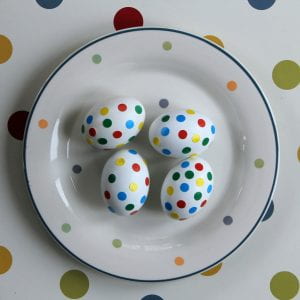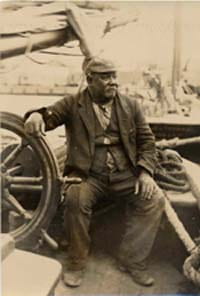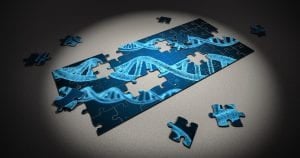The topic this week at #ANZAncestryTime was related to DNA
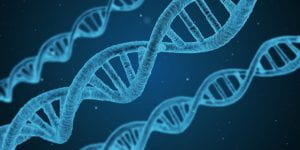
Including tools on DNA testing sites and non-testing sites, which tools do you use the most? Which ones are useful? Ease of use?
My favourite DNA tools are the shared cM tool and histograms; matrix comparisons in GEDmatch; Ancestry groups; DNA painter and chromosome browsers anywhere.
I forgot to mention Clusters and My heritage’s Auto Clusters
I haven’t found the autoclusters much use yet, despite watching a few talks on them. It looks very pretty though!
Clusters can be uploaded into a chromosome map using the Cluster Auto Painter tool at DNAPainter for a different visual perspective
I build my tree from my DNA matches on my computer, tagging each link until I get back to the common ancestor (or not). Some families I match nearly every child of a common ancestor. I have a lot of brick walls to find.
Ancestry has tags for ‘DNA match’, ‘DNA connection’ etc. Or you can make your own custom tags – tags are searchable. Unfortunately they don’t sync through to Family Tree Maker though
Yes, I have most good matches on Ancestry, but have uploaded to FTDNA, MyHeritage, LivingDNA, Gedmatch. Best bang for buck 🙂
When I use the MyHeritage autocluster, I use it in conjunction with the Cluster Auto Painter at DNAPainter. WATO at DNAPainter is another tool I use a lot
Once I have clusters I explore each group in turn. I use coloured dots on Ancestry, Thrulines, and build trees for DNA matches in one big research tree. Once I prove a connection I add it to my verified tree.
used the DNA testing sites of Ancestry and myheritage. Both come out with similar results, as some matches are on both sites. Some very accurate. Use groups on ancestry but so many matches hard to keep track.
My starting point for analysing DNA matches is to do clustering using the DNA Gedcom Client. I can then import the output files into GDAT so that my analysis across all the testing sites in one place.
I use GDAT to import all my matches – then my analysis is all in one place and I can see where matches have tested at multiple sites. its a bit of a learning curve, but worth it in the end.
I also use the shared cM project on DNA Painter to work out where the possibilities could be
The shared cM project is great to show people that do not understand how you can estimate the relationship with a match. I often use it with beginners.
Important to look at the histograms too. Adding them to the cM Project calculator on DNAPainter has been hugely helpful
The tool I use the most is the dots in the @Ancestry DNA section of their website. Most nights I check for new matches & find none. If there is a new match I check the Shared Matches, pink or blue dot them if I can work out if they are maternal or paternal.
test at Ancestry because of its bigger testing pool then upload the raw dna data to MyHeritage FTDNA and Gedmatch – plus Wegene if you have East Asian ancestry – fish in all ponds as they say
I use the shared matches from Ancestry and check out any connected trees to see if there are any common names, couples, or places and group them.
In Ancestry I always go with the shared ancestors filter first as those people have a tree that can give hints to include more people on your tree
Big fan of the DNA Painter toolset. Have used the shared cM tool to help a DNA match who was an adoptee narrow down potential families she could be related to, with success!.
I did all the DNA sessions at Rootstech and have done many webinars but need to action what I learn before I forget. That’s my DNA problem
I like the thrulines on Ancestry as a way to prove some cousins back 3 or 4 generations but prior to that I need more proof.
I am always a little cautious seeing much is based on peoples trees for thrulines and my tree is not that big so I often need to verify new persons. It would be quicker if people attached sources.
I would suggest you message them and ask. I don’t have sources in my tree as it is a gedcom export from my desktop software but I am always happy to explain those sources if I get asked. Maybe they do the same.
Good suggestion. I like doing the quick and dirty DNA trees so sometimes end up having so much fun tracing up or down branches I don’t end up figuring out the connection with the match.
Ancestry’s Thru Lines, MyHeritage Theories of Relativity and Clusters, Dana Leeds – Leeds Collins method
thrulines have been hit and miss as it relies on other people’s trees which some are not correct. I have illegitimate Great grandmother but thru lines try to say who her spouse is.. incorrect.
DNA Painter’s WATO tool helped me prove who was my dad’s true grandfather from unknown DNA matches
That is what I want to use if possible. However, I do have endogamy in the family and I understand it does not work as well with that
I also use GEDmatch especially who matches 1 or 2 people
I find the Gedmatch matrix comparisons for ICWs easy to use and interesting to compare diff % of inheritance between cousins.
Ancestry’s dots, MyHeritage, FTDNA, Gedmatch. Wegene, DNAGedcom, DNAPainter. I eyeballed ALL Ancestry DNA results & colour dot them & do it with my sister – also my husband & his sister – there can be a lot of variation between size of matches siblings have
Shared matches on Ancestry. Comparisons using Gedmatch on WikiTree. Chromosome browsing on MyHeritage. Using my own spreadsheets of matches.
I have tested with five companies and mostly I use DNA Painter to paint chromosomes and Ancestry’s colour coding to help identifty matches. I also use Gedmatch and livewllo. The latter gives me a health report
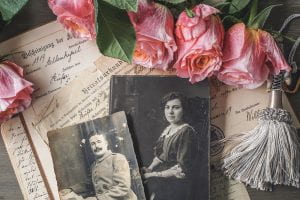
Has analysing your matches with tools & techniques helped you narrow down ancestral lines, place matches on your tree, find common ancestors, add or prune branches. etc?
Even with good DNA matches, the absence of records from the paper trail can make the connection impossible to pin down. One link has multiple siblings who match Mum and we know the likely county, but no Irish records means a blank wall.
Yes … DNA never stands alone … just one piece of the puzzle to be weighed up within a broader body of evidence
Having identified cousins makes it easier to allocate lines except when there are no trees or further clues to be sure where unknown matches fit. Life’s too short to be forever building trees
But sometimes building trees is where the answers lie
for years I researched my 3xgtgrandmother’s family named King, then I got 3 x 3rd cousin DNA matches all related to the same family, named Perry, discovered that 3 x gtgrandmother’s father named on her birth cert is in fact not her real father
Through DNA matching I found my paternal gggfather’s siblings and parents also my ggmother’s sister. Now trying to go back another generation. Still have brickwalls to find.
And I have found birth fathers for a number of people whose DNA match some of the kits that I manage. I have another request to help with an adoption in Victoria whose closest cousin matches one of those I helped.
haven’t used any specific tools yet just use common ancestors on Ancestry to check things out. I do paper trail first of matches to do comparisons. Myheritage comparisons are not as accurate though, even with high number of matching segments.
I’ve connected a large number of matches to my tree; some pedigree triangulations which seem, from records, genealogically correct but may or may not reflect where the DNA has come from, some segment triangulation groups which I am more sure of
I was wondering why I had no DNA matches for my 2xGGF until a recent 444 cM match turned up & changed everything. Could be a case of NPE (Non parent event / naughty parental event). Ancestors can say what they want but DNA doesn’t lie.
I bet they’d be horrified that all their secrets are coming out. I found a bigamist (just through records). I bet they never envisaged we would have access to almost all parish records simultaneously
I bet they would be too. That would have been a shock to find that out. Convict origins wanted to be forgotten. I had one research hint in Ancestry pop up that my ancestor was a convict. Which explained his free passage to Aus.
I have also helped a number of my DNA matches identify bio family. Met up with a new 3rd cousin last UK trip as we were both visiting at the same time, and went to places our ancestors lived, followed by a pub lunch.
I have confirmed most of my lines back to 3xGGPs and I’m already starting to see some 4xGGP connections. Now that I have eliminated all my known lines I’m working to identify my mystery 2xGGF with the fake name 🙂
I have also found connections to DNA matches in Australia and Canada which sheds some light on people who have ‘disappeared’
My US ancestral line name was Adams, very common name. I expected to be swamped with US Adams related DNA matches & after 4.5 years not so- Adams was an alias for real surname Brown – which I only uncovered by constructing my match’s tree and lots of hard work
DNA helped solve the mystery of my husband’s Tiearney ancestry back to East St Louis, Ireland and South Africa – confirmed family legends and corrected some misinformation
my husband’s family lore had an ancestor Daniel Dering Mathew – remittance man descended from Mary Boleyn (sister of Ann Boleyn)- Catherine Knollys then Byam Mathew’s – DNA results have supported this family legend
What a great story KerriAnne. My husband’s mother handed me her family tree showing she was a 23rd cousin to Prince William and Harry. I quickly found the huge error but let her believe it as she was over 90
I have taken my husband’s DNA, and his sister’s from MyHeritage FTDNA chromosome browsers and combined them to create a pseudo map in DNAPainter for matches that my late mother in law would have had
FTDNA mtdna and ydna have helped with my direct maternal line, direct paternal line and my husband’s direct paternal line – especially as there were illegitimacies along the way
testing other relatives really helps though it’s not a tool itself. I’ve got 1st cousins for each of my parents on each side – sorts matches by my great-grandparents.
haven’t used any specific tools yet just use common ancestors on Ancestry to check things out. I do paper trail first of matches to do comparisons. Myheritage comparisons are not as accurate though, even with high number of matching segments.
100% before these tools were around I had tested & used gedmatch. We were at sea – sending random emails hoping someone would recognise a surname. I had 1 match that took years to figure out. Compare to a recent new match on MyH which I had sorted in 2 hours
I confirmed the father of an adoptee in my family who lives in the US with the help of a child of his. in his 80’s he has now met his half siblings
It’s interesting to see how DNA inheritance will throw up a match to a new link who might not match other testers. I have found a few extra lines or confirmed hypotheses.
I always start with the highest cM and when I know where they are on the tree, I add them to my tree up to our common ancestor and use the DNA tags on Ancestry
I have added my matches down to 20cM from each site I have my DNA on except the two sites I added it to recently. They are still to be done. I colour code it by family including potential family (no trees). Then I can see what needs to be worked on
Despite having attended many DNA sessions & read books / blogs, joined FB groups, etc with my low number of 4th cousin or better matches I struggle to progress my FH research with DNA. Waiting patiently for more matches to use different tools.
DNA matches have confirmed a large part of my family history research. I hope DNA matches can find my biological German g g grandfather
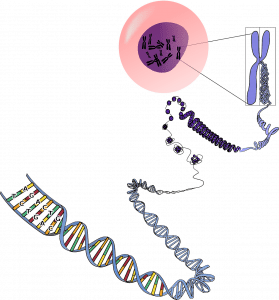
What DNA tools do you use to help with your DNA match sorting? Do you add and compare match data from different websites?
I tend to just use spreadsheets for this purpose. If you want to download your DNA match lists, you may find this Guide from Diahan Southard useful: yourdnaguide.com/ydgblog/how-to…
As a follow up I also paid for an analysis of my Ancestry DNA results by a crowd called Connected DNA. Great colour coded visualizations, multiple spreadsheets and much more sophisticated triangulation/grouping than possible on Ancestry
I use Ancestry DNA and also MyHeritage and sometimes FTDNA and Gedmatch because not everyone tests at all of these. I also find dna triangulation on MyHeritage Gedmatch and FTDNA helps – wish Ancestry had a chromosome browser so I could do triangulation there
I tried to use GenomatePro after @GenealogyLass recommended but found the setup really onerous so I just went back to checking site by site but I cross-ref in my offline tree. I’ll note a person is a match with XcM on which site, etc.
Has been replaced by GDAT now. The setup is much the same, but the functionality is more streamlined. If you need help setting up give me a shout 🙂
I import all my data into GDAT. It is all in one place, can analyse, write research notes, filter and sort, use matches who have tested at >1 site to make new connections between groups, identify names or locations in common.
Definitely worth siblings and cousins doing DNA testing because of the variation in matches that siblings etc have with the same cousin.
I have also had dad tested YDNA and mtDNA because his paper trail does not match the DNA trail on either side. I mainly got dad tested as he is 89 and the oldest in his generation. Also he is my problem DNA person. Neither test has been much use so far
Forgot I did my mtDNA as well – it has been 0 use. Have some male lines tested with Y37 just to get their DNA recorded but can’t afford the big bucks to upgrade & feel it’s a much more specialised area. With ltd Irish records, I don’t know how much use it can be.
Yes, I add my matches to my spreadsheets and to my computer-based tree. For each match I give the DNA information – so there can be information from more than one site.
analysing matches broke down brickwalls in Dad’s American ancestry – which couldn’t have been achieved without combination of DNA with traditional genealogical approaches. DNA also helped with illegitimacies – confirming family stories of who fathers were.
I haven’t done enough downloading and comparing matches from different testing sites. I get part of it done then stop.
I have a spreadsheet for dad and another for mum and tabs in each for the different companies and comparisons within them all. I need to use it more efficiently though

Do you consider ethnicity results as a tool to help your family history research? Discuss any thoughts, pros and cons when using ethnicity results.
The ‘ethnicity’ results have their place when weighed up alongside broader range of evidence but only as good as reference panels and algorithms used. Genetic communities more reliable (different methodology, more recent time frame)
I have found my Ethnicity changed several times so not sure how valid it really is, but I did upload my DNA to @Living_DNA a few years ago (see pic), and my Ethnicity has been the most accurate so far out of any other company
ethnicity has proven the my paper trail areas of research have been correct either north east Scotland or West Midlands in England.
Ethnicity is not much use for me or the kits I manage – we’re all typically British 🙂 But it has been useful in helping people find bio family when different lines come from different backgrounds. I used to dismiss it but always check it now
I used to dismiss ethnicity however in some cases it can help eg my husband has a Scottish great grandfather married to an Irish great grand mother – so ethnicity helped to split which lines folks in that part of the family came from
Same! I used to be very dismissive but Ancestry estimates have improved and the genetic communities are useful, so now I always check it at least.
Afro Scottish ethnicity in some of my Jamaican matches points to some relatives of my ancestors being in the West Indies in the slavery era – which was confronting when I first noticed it
Considering my DNA ethnicity is different with each of the five companies and my German doesnt show up where it should I don’t find ethnicity helps with research. maybe if I had a surprise
I used to think that ethnicity results was marketing tools to get more people to test. Acknowledge the limitations of the ethnicity data, then it can help support theories & suggest areas to research especially for adoptees and mis-attributed parental events.
I admit to treating ethnicity results with fair disdain. I had high hopes of Living DNA results but there are anomalies compared to the paper trail. Mostly I get my more recent ancestry, Irish and Scots. Still no German sadly.
My mum has 548 4th cousins or closer while dad only has 318 4th cousins or closer on Ancestry. Lot easier to colour dot mum’s matches
I have hardly any identified paternal matches across the sites. Multiple generations of people with very few kids means the matches are further back & possibly in the realm of no records to support.
I have a similar problem. Research my families and there are few descendants. Only one of my father’s sisters has descendants. Not much better for the previous generation where mainly only one child each. I have to go a long way back for matches
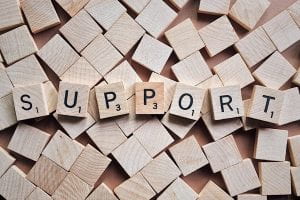
Need some basic info as well as advanced DNA help – check these out
Louise Coakley blog
DNA genealogy in Australia and NZ – Facebook group run by Louise
Blog posts relating to DNA
Jane: Basics on autosomal testing, hypothesizing and speculating,
Pauleen: DNA – place and people,
Kerrie Anne: Matches in Adams/Brown family,
Great comments:
DNA is the ultimate in time distraction.
DNA tools have to be easy enough to use to make them useful.
Also check out the summary of the #ANZAncestryTime discussion on Apps for Family History. Some useful apps for DNA were mentioned.
Readers: Have you tested your DNA? Have your results been what you expected?
